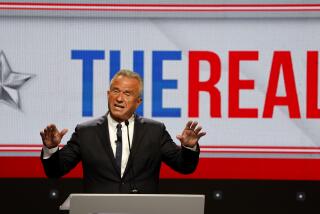Bush Negativity Will Backfire, Kirk Says
- Share via
WASHINGTON — Vice President George Bush “seems to have a negative lock” on the presidential race but has run such a divisive, mean-spirited campaign that, if elected, he will have serious difficulty governing, Democratic Chairman Paul G. Kirk Jr. said Monday.
Kirk lashed out at what he called “the deceit and distortion” of the Bush campaign and accused Bush of following a conscious strategy of trying to destroy the candidacy of Democratic nominee Michael S. Dukakis by lying about his record and appealing to “the base, meanest instincts of the American people.”
Such campaigning “means nothing but cynicism for the body politic,” not a mandate to govern but “a negative mandate” and a divided people that would confront a Bush presidency, he said.
No Comment on Mandate
Bush has refused to talk about a mandate. A week ago, at one of his rare campaign press conferences, he refused to answer questions about what he would do about the budget and other issues if he is elected, saying only: “I can’t comment on the mandate.”
With only two weeks to go until the Nov. 8 election, Kirk said, Dukakis’ most important challenge is to “break the negative lock” by focusing on the tone of the Bush campaign while making a positive appeal to the electorate and spelling out to the American people “where we go from here.”
“My bottom line is, it still isn’t too late,” said Kirk, whose harsh assessment of the Bush campaign was delivered during a luncheon session with reporters.
But Kirk sounded anything but optimistic about the Massachusetts governor’s chances of overtaking Bush, who has consistently led in the polls almost since the Republican convention in mid-August.
When asked how the Democrats can put together enough electoral votes to win the presidency when polls show Bush leading in every region of the country, Kirk said Dukakis is concentrating his campaign on the West, Midwest, New England and mid-Atlantic states “and is still competitive in a few of the border states.”
No Reference to South
However, he never mentioned the South, which Dukakis considered a crucial battleground in his early campaign planning.
In making his case for Dukakis, Kirk cited a Newsweek poll published this week showing that 58% of those surveyed said the electorate is still undecided whether to support Bush or Dukakis. With many persuadable voters, Kirk said, the election is still within Dukakis’ reach.
He acknowledged, however, that the much-ballyhooed Democratic campaign to register new voters has not been “all that we had hoped for.” Although he insisted that “the jury is still out” on the final results of the registration drive, other party sources have said that the effort has fallen considerably short of expectations.
Civil rights leader Jesse Jackson, who finished second to Dukakis in the Democratic primaries, had been counted on to play a leading role in the registration drive and the Dukakis campaign. Kirk said Jackson has played a major role, campaigning “day in and day out,” but has gotten relatively little national attention because he is not on the party’s ticket.
At the same time, Kirk said, there continues to be “some unhappiness” among blacks that Dukakis did not select Jackson as his vice presidential running mate. Some political observers say that is one reason polls show Bush attracting up to 20% of the black vote--about twice the size of the black vote polled by President Reagan.
More to Read
Get the L.A. Times Politics newsletter
Deeply reported insights into legislation, politics and policy from Sacramento, Washington and beyond. In your inbox twice per week.
You may occasionally receive promotional content from the Los Angeles Times.










